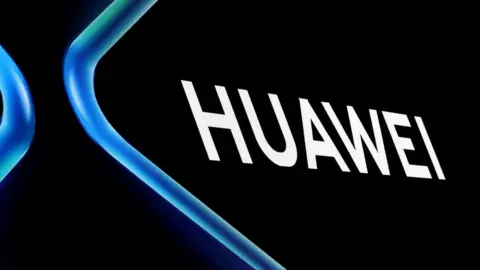Huawei announces its new Harmony operating system
 Reuters
ReutersHuawei has announced it is developing a new operating system called HarmonyOS.
There had been speculation that Huawei was planning to replace the Android operating system which powers its smartphones and tablets.
In May, Google suspended the company's Android licence after the US government put Huawei on a trade blacklist.
However, Huawei said HarmonyOS would first be used in devices such as smart speakers and watches, rather than replacing Android in its phones.
"HarmonyOS is completely different from Android and iOS," said Huawei's Richard Yu, who announced the project at the Huawei Developer Conference in Dongguan, China.
He said the operating system would let developers create one version of their apps and then "flexibly deploy them across a range of different devices".
Graphics displayed during his presentation did include depictions of smartphones as well as watches, cars and televisions.


A majority of smartphones around the world run on some form of the Android operating system, so being cut off from the ecosystem could make Huawei's phones less appealing.
There were rumours that the company was going to replace Android in its phones, but Huawei says HarmonyOS will be used to power smart devices such as TVs, speakers and watches - at least to begin with.
If the operating system does make its way on to Huawei's phones, consumers will expect to have access to all their favourite apps.
But app makers already have their hands full developing their software for Android and Apple's iOS.
Huawei will have to convince them to develop yet another version for HarmonyOS, with no guarantee that people will buy the devices.
This is a problem faced by anyone hoping to challenge the dominance of Android and iOS.
It plagued BlackBerry 10, which never convinced some of the world's biggest apps such as Instagram to support the platform.
Rival phone-maker Samsung already has its own Tizen operating system which powers many of its smart devices - but even it uses Android to power its flagship phones.

Huawei said it would initially focus the development of HarmonyOS on China, with plans to expand availability globally in the future.
It said HarmonyOS would be an open-source platform so that anybody could use the software to create compatible devices.
The core of Google's Android OS is also open source, so companies can take the code and use it however they want. This approach is taken by Amazon in its Fire tablets.
However, there are restrictions on what phone-makers can do with Android if they want access to the Google Play app store, and to Google's suite of popular apps such as Maps and YouTube.
Ben Wood from the CCS Insight consultancy said Huawei's announcement was an "inevitable move".
But he added: "Replacing [or] displacing Android is a virtually impossible task."
In China, the new operating system will be called HongmengOS.
